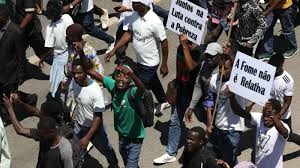At least 22 people, including a police officer, have been killed and more than 200 injured in violent protests that erupted across Angola following a steep increase in fuel prices. Interior Minister Manuel Homem confirmed the casualties and revealed that over 1,200 people have been arrested since the unrest began on Monday as a taxi drivers’ strike spiraled into one of the most widespread waves of protest the country has seen in years.
The demonstrations, which started in the capital, Luanda, quickly spread to the provinces of Huambo, Benguela, and Huíla, leading to the closure of businesses, including major supermarkets, and forcing many residents to remain indoors. Doctors at public hospitals reported being overwhelmed by the influx of injured protesters, warning that the true death toll could be higher than official figures. Sporadic gunfire was reported in several areas of Luanda as security forces struggled to contain the unrest.
Minister Homem described the events as “acts of vandalism that endanger public security,” while President João Lourenço stated that the protests were being fueled by “infiltrators with criminal intentions” who had turned a strike over fuel prices into a threat to public order. The government said many buildings, including supermarkets, shops, and banks, had been looted or destroyed, while ambulances, buses, and private vehicles were also damaged.
The protests were triggered by the government’s decision to raise the price of diesel by more than 33% in early July as part of a plan to remove fuel subsidies in the oil-rich nation. The move has had a severe impact on ordinary Angolans, pushing up taxi fares and driving up the cost of food and basic goods as suppliers pass on the additional costs to consumers. Long queues have formed at petrol stations as citizens try to stock up on fuel and essential supplies amid growing uncertainty.
Taxi unions, which initially called a three-day strike, have distanced themselves from the looting and destruction, saying they do not condone violence or vandalism. However, opposition coalition Patriotic United Front (FPU) blamed the crisis on “public policies disconnected from the country’s reality, poor governance, corruption, and the government’s lack of human sensitivity,” while also condemning the destruction of public and private property.
The unrest has drawn international concern, with several consulates and embassies issuing security warnings to foreign nationals. The US embassy advised its citizens to “remain vigilant and limit non-essential movement within Luanda,” while Lufthansa cancelled a flight from Frankfurt to Luanda, citing “safety and security concerns.”
As Angola grapples with economic challenges, including high inflation and widespread poverty, the fuel price hike has become a flashpoint for public frustration. With security forces deployed across the capital and military vehicles on the streets, the government faces growing pressure to address the economic strain driving the unrest while attempting to restore calm to the country.














Leave a comment